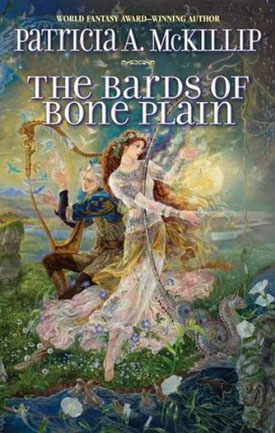 I’ve noted before the importance of music in the works of Patricia McKillip. I’ve probably also said something about the poetic quality of her writing. I know I’ve mentioned the way magic infuses her stories, context rather than event. That’s all here, in The Bards of Bone Plain, a story about poetry and music and magic.
I’ve noted before the importance of music in the works of Patricia McKillip. I’ve probably also said something about the poetic quality of her writing. I know I’ve mentioned the way magic infuses her stories, context rather than event. That’s all here, in The Bards of Bone Plain, a story about poetry and music and magic.
There are actually two stories here, the story of Nairn, a crofter’s son who has music in his bones, who sings his first songs to the pigs and keeps looking for what’s under the words until taken in hand by the King’s Bard Declan, who can’t teach him what he wants to know because it’s part of him already. That story is far in the past.
There is also the story of Phelan Cle, which becomes, at least in part, the story of his father, Jonah. Phelan is a student at the bards’ school founded centuries before by Declan, anxious to graduate, writing his final paper on Bone Plain with its three trials, three treasures, and three terrors, which has been lost somewhere. Jonah is rich, drinks a lot, and has strange enthusiasms, one of which seems to have made him determined to dig up the environs of the royal city of Caerau, searching for something, with Beatrice, the king’s youngest daughter, as his willing accomplice. He may even know what he’s looking for, but he’s not inclined to share secrets.
And in both stories there is a mysterious bard named Welkin, or Kelta, with no history, no origins, but with a harp that knows magic. And one of the keys to the mystery — or mysteries: one is never quite sure just how many there are — is the Circle of Days.
I’ve been reading Patricia McKillip’s books for more years than I want to admit at this point, and The Bards of Bone Plain has everything that has kept me coming back to them again and again, refined, distilled, and that much more potent. It’s all here: the terse, contemporary dialogue that never seems out of place in her fantasy universe with its echoes of times long past. And that sense of time, that history that stretches back beyond what anyone can know, built of ancient menhirs, nearly incomprehensible runes, old songs, all somehow mute, themselves the source of the mysteries that drive the characters. The characters themselves are immediate, sometimes earthy, not always earth-bound, exceptional people leading more or less normal lives who sometimes find themselves trapped in great destinies. Phelan finds himself caught in one of those destinies, although it’s not his. Zoe Wren, his friend and fellow student at the school, falls into hers almost without realizing it, while the mysterious bards Welkin and Kelta may very well be destiny, for someone. Jonah’s destiny, as we discover, is the story.
McKillip works in metaphor. That’s one thing to remember: the surface narrative is engaging enough, but it’s only half the story — in this case, somewhat less than half. The story is about people searching for meanings under the words they know, meanings hidden in ancient writings, meaning hidden in songs and poetry, and the story is built of meanings that lie under the words on the page, words spoken that we don’t really hear, events that happen in places we weren’t looking, even though we thought we were.
McKillip’s diction has always verged on poetry, a thing of inference and music. Here, it comes perilously close to surfeit, but never quite breaks that boundary. It’s not a book to try to read all at one sitting, though — it’s too rich, too circumspect, too inferential, a book that needs to let us rest so we can put the pieces together. And the pieces are there — McKillip doesn’t cheat, but she does make us work, in a way. Like Nairn, like Phelan, like Zoe, we need to find that still place under the words and there let them speak to us. Then the story unfolds.
(Ace Books, 2010)
